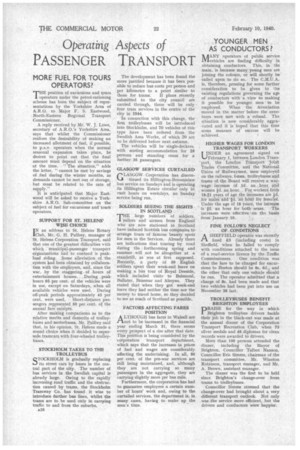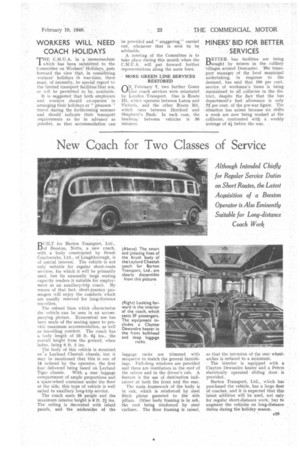Operating Aspects of
Page 38

Page 39

If you've noticed an error in this article please click here to report it so we can fix it.
PASSENGER TRANSPORT
MORE FUEL FOR TOURS OPERATORS?
THE position of excursions and tours operators under the petrol-rationing scheme has been the subject dl representations by the Yorkshire Area of A.R.O. to Major F. S. Eastwood, North-Eastern Regional Transport Commissioner.
A reply received by Mr. W. J. Lowe, secretary of A.R.O.'s Yorkshire Area, says that whilst the Commissioner realizes the desirability of making an increased allotment of fuel, if possible. to p.s.v operators when the normal seasonal expansion takes place, he desires to point out that the final amount must depend on the situation at the time. " The situation," adds the letter, " cannot be met by savings of fuel during the winter months, as demands cannot be met out of storage, but must be related to the rate of supply."
It is anticipated that Major Eastwood will be asked to receive a Yorkshire A.R.O. Sub-committee on the subject of fuel for excursions and'toues operators.
SUPPORT FOR ST. HELENS' WISE CHOICE
I N an address to St. Helens Rotary
Club, Mr. G. H. Pulfrey, manager of St. Helens Corporation Transport, said that one of the greatest difficulties rah which municipal-passenger transport organizations had to contend is peakload riding. Some alleviation of the system had been obtained by collaboration with the employers, and, since the war, by the staggering of hours of entertainment houses. During peak hours 95 per cent. of the vehicles were in use, except on Saturdays, when all available vehicles were used. During off-peak periods approximately 45 per
cent. were used. Short-distance passengers represented 50 per cent, of the annual fare receipts.
After making comparisons, as to the relative merits and demerits of trolleybuses and Motorbuses, .Mr. Fulfrey said that, in his opinion, St. Helens made a sound choice when it decided to supersede tramcars with four-wheeled trolley buses. , STOCKHOLM TAKES TO THE TROLLEYBUS
STOCKHOLM is gradually replacing its street cars by buses in the central part of the city. The number of bus services in the Swedish capital is already large. Owing to the rapidly increasing road traffic and the obstruction caused by trams, the Stockholm Tramway Co. has found it wise to introduce further bus lines, whilst the tram are to be used only in carrying traffic to and from the suburbs.
a28.
The development has been found the more justified because it has been possible to reduce bus costs per person and per kilometre to a point similar to
those for trams. If plans recently submitted to the city council are carried through, there will be only four tram services in the centre of the city in 1944.
In connection with this change, the first trolleybuses will be introduced into Stockholm, and 70 vehicles of this type have been ordered from the Swedish Asea Works, of which 20 are to be delivered before next autumn.
The vehicles will be single-deckers, with seating accommodation for 24 persons and standing room for a further 35 passengers.
• GLASGOW SERVICES CURTAILED
GLASGOW Corporation has discontinued its Hillington-Broomielaw :bus service on Sundays and is operating its Hillington Estate circular only at rush hours on weekdays, no Sunday service being run.
SOLDIERS SEEING THE SIGHTS IN SCOTLAND large numbers of soldiers, sailors and airmen from England" who are now stationed in Scotland have induced Scottish bus companies to arrange toms of famous beauty spots for men in the Services. Already there are indications that touring by road during the forthcoming spring and summer will not be altogether at a standstill, as was at first supposed. Recently, a party of 59 English soldiers spent their week-end leave on making a bus tour of Royal Deeside, which included visits to Balmoral, Ballater, Braemar and Aboyne. They stated that when they got week-end leave they had neither the time nor the money to travel home, so they decided to see as much of Scotland as possible.
FACTORS AFFECTING FARES POSITION
A LTHOUGH bus fares in Walsall are /-1.not to be increased in the financial year ending March 31, there seems every prospect of a rise after that date. This position is being considered by the corporation transport department, which says that the increases in prices of fuel and wages are considerably affecting the undertaking. In all, 80 per cent, of the pre-war services are still being maintained, and, although they are not carrying so many passengers in the aggregate, they are carrying slightly more per bus mile.
Furthermore, the corporation has had to guarantee employees a certain number of hours' work and, owing to the curtailed services, the department is, in many cases, having to make up the men's time.
• ,YOUNGER MEN AS CONDUCTORS?
NAANY operators of public service alvehieles are finding difficulty in obtaining conductors. This, in the main, is because many young men are joining the colours, or will shortly be called upon to do so. The C.M.U.A. is, therefore, pressing for some further consideration to be given to the existing regulations governing the age of conductors with a view to making it possible for younger men to be employed. When the Association moved in the matter before the overtures were met with a refusal. The situation is now considerably aggravated and it is hoped that this time some measure of success will be achieved.
HIGHER WAGES FOR LONDON TRANSPORT WORKERS
UNDER an agreement signed on February 1, between London Trans.. 'port, the London Transport Joint Trades Committee, and the National Union of Railwaymen, mere employed on the railways, buses. trolleybuses and trams of, the Board will receive a warwage increase of ,id. an hoer and • women id. an hour. For workers from 1841 years of age the increases are id, for males afid fd. an hour for females.. Under the age of 18 years, the increase
is id. an hour for both sexes. The increases were effective on the buses from January 10.
FINE FOLLOWS NEGLECT OF CONDITIONS .
ASHEFFIELD operator was recently fined E5 (including costs) in Sheffield, when he failed to comply with conditions attached to the issue of a road-service licence by the Traffic
Commissioners. One condition was that the fare to be charged for excursions to Boston should be 8s. 6d., and the other that only one vehicle should be run. The operator admitted that a charge of 8s. had been made and that two vehicles had been put into use on November 26 last.
TROLLEYBUSES BENEFIT BRIGHTON EMPLOYEES DRAISE for the way in which 1 Brighton trolleybus drivers taekle their job in the black-out was made at the annual dinner of the Corporation Transport Recreation Club, when 73 silver medals and 48 diplomas for clean records were awarded to drivers.
More than 100 persons attended the dinner, including the Mayor of Brighton, Councillor Talbot Nanson, Councillor Eric Simms, chairman of the transport committee, Mr. Winston Robinson, transport manager, and Mr. A. Brown, assistant manager.
The dinner was the first to be held since Brighton's change-over from trams to trolleybuses.
Councillor Simms stressed that the change-over had brought about a very different transport outlook. Not only was the service more efficient, but the drivers and conductors were happier.
WORKERS WILL NEED COACH HOLIDAYS
THE C.M.U.A. in a memorandum which has been submitted to the Committee on Workers Holidays, puts forward the view that, in considering workerst holidays in war-time, there must, of necessity, be special regard to the limited transport facilities 'that are, or will be permitted to be, available. It is suggested that both employers and workers should co-operate in arranging their holidays or " pleasure travel during the forthcoming summer and should indicate their transport requirements as far in advance as possible, so that accommodation can be provided and " staggering," carried out, whenever that is seed tct be advisable. A meeting of the Committee is to take place during this month when the C.M.I.T,A, will put forward further representations along the same lines.
MORE GREEN LINE SERVICES RESTORED
rIN. February 7, two further Green L--/Line coach services were reinstated by London Transport, One is Route HI, which operates between Luton and Victoria, and the other Route Ml, which runs between Hertford and Shepherd's Engl.. In each case, the .headway between vehicles is SO minutes. MINERS' BID FOR BETTER -SERVICES BETTER bus facilities are being sought by miners in the colliery villages around Doncaster. lilbe transport manager of the local municipal undertaking, in response to the demand, has said that Ion Per cent. service of workmen's buses is being maintained to all collieries in the district, despite the fact that the bus department's fuel allowance is only 72 per cent, of the pre-war figure. The situation has arisen because six shifts a week are now being worked at the collieries, contrasted with a weekly average of 41 before the war.




























































